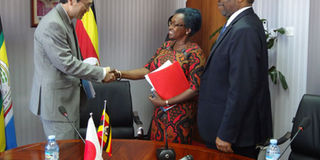Government acquires Shs45 billion Japanese grant for hospitals

Japanese ambassador Junzo Fujita (L) meets Finance minister Maria Kiwanuka and Health minister Ruhakana Rugunda (R) after signing the deal in Kampala last week. Photo by Stephen Wandera.
What you need to know:
The money will be used to rehabilitate Hoima, Kabale and Fort Portal hospitals.
The government has received a grant of $18 million (about Shs45 billion) from Japan, which will be used to boost medical facilities and rehabilitate three referral/major hospitals in Western Uganda.
The deal, recently signed by Finance minister, Ms Maria Kiwanuka, the Japanese Ambassador to Uganda, Mr Junzo Fujita and Dr Hirofumi Hoshi, the Chief Representative of JICA Uganda, is one of the many grants the government has received to facilitate growth and development of the health sector.
The agreement
According to a press statement issued by the Japanese Embassy last week, the grant will be channelled to projects for the rehabilitation of hospitals and supply of medical equipment in western part of the country.
The project will particularly facilitate the functions of medical services in Hoima, Kabale, and Fort Portal hospitals—all major hospitals with an important role in the western region’s health sector.
And through the construction of facilities and the procurement of medical equipment, more than 6 million people are expected to benefit from the project.
“The project will improve the quality in medical services and ensure an efficient and effective regional referral system in the Western region,” reads the statement.
However, analysts argue that giving a grant is one thing and implementing it to its logical conclusion is another matter. According to Prof Augustus Nuwagaba, an analyst on social and economic matters, the success of the project will be judged by its impact rather than the money involved.
Mr Moses Ogwal, a policy analyst, said earlier that the problem with donor support is dictating how the grant should be used. “As long as that is the problem of the region (short of facilities and supplies) then it is okay. But if that is not the biggest need there then the impact of the project may be wanting.”




